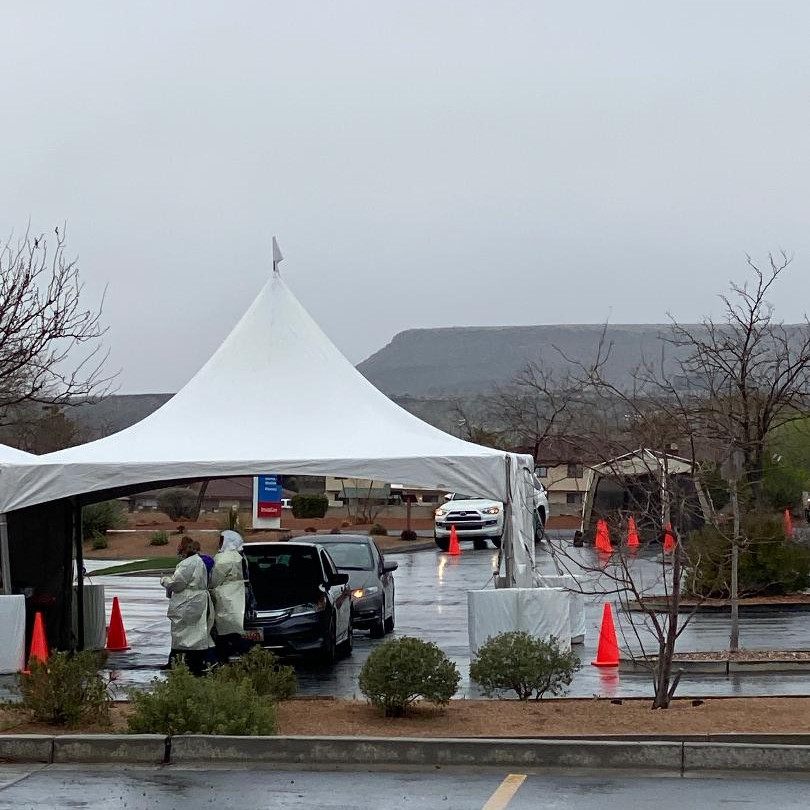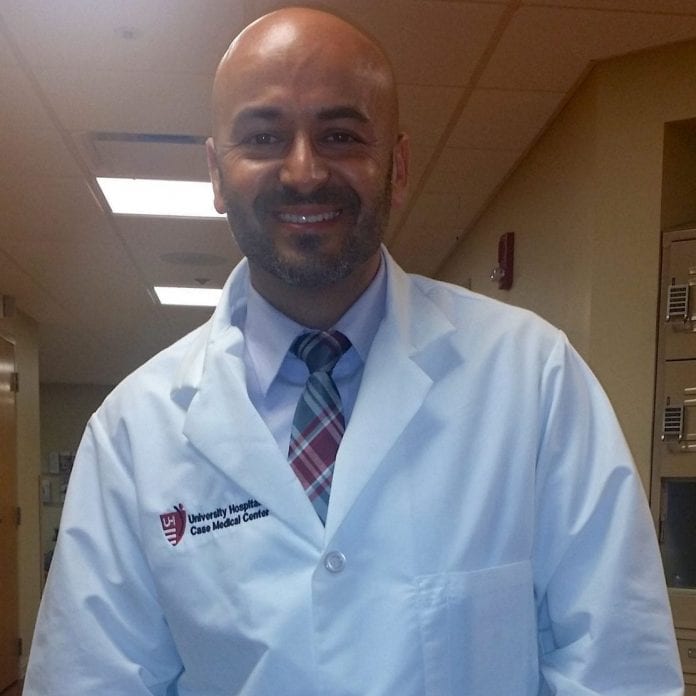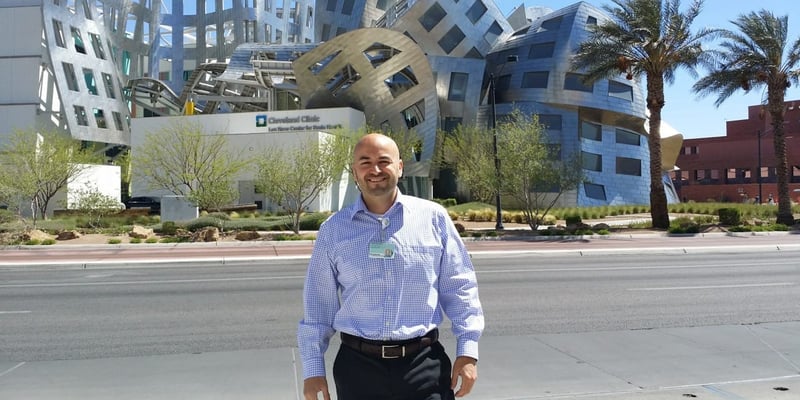UMHS 2015 grad and inpatient psychiatrist Dr. Aaron Vazquez works at Intermountain Healthcare Dixie Regional Medical Center, a 284-bed hospital in St. George, Utah. He said the hospital is adapting in numerous ways, from using tele-medicine appointments to offering drive-through COVID-19 testing.
For our new series “Alumni On the Front Lines,” featuring UMHS grads working in medicine during the COVID-19 pandemic, the UMHS Endeavour interviewed Dr. Vazquez about how COVID-19 has changed working in a hospital and discussed everything from preparations for potential Coronavirus patients to ways everyone can cope with the psychological aspects of the pandemic.

Drive-through COVID-19 testing site at Intermountain Healthcare Dixie Regional Medical Center in St. George, Utah. Photo: Courtesy of Dr. Vazquez.
Preparing for the Worst
What’s happening at the hospital Dr. Vazquez is working at?
“There is certainly a sense of readiness to serve and be prepared for the worst,” Dr. Vazquez said. “I would be lying if I didn’t admit to feeling eerie when I come to work and see the parking lot half empty, including the physician parking area.”
Numerous things are being done to minimize unnecessary contact with patients.
“Whenever possible, the physicians within our organization (Intermountain Healthcare) are utilizing tele-health to deliver care, thereby reducing the volume of people in the clinic and limiting exposure to the potential virus,” he said. “We are no longer allowing visitors to enter the hospital or anyone else that is not coming in for care.”

The hospital has also started testing patients for COVID-19.
“A designated area of our parking lot is sectioned-off for drive-through COVID-19 testing for patients, who are deemed high risk. Recently, the Utah Department of Health arrived with trailers carrying supplies that included tents to potentially extend the capacity of our ED should the need arise. “
As a psychiatrist, Dr. Vazquez offers insight on how the pandemic has affected mental health in America.
“The pandemic has created a much-needed purpose in the lives for many Americans,” he said. “The psychiatrist, Victor Frankl, wrote about the importance of finding purpose in his famous book, Man’s Search for Meaning. He postulated that striving to find meaning in life is the primary, most powerful motivating and driving force in humans. Families and communities are coming together to help one another become prepared for the worst.”
Not being able to interact with others socially has some noticeable effects indeed.
“As social creatures, it is a win for mental health when we come out of isolation to engage with others in the community,” Dr. Vazquez said. “This has helped to improve the social fabric and ease tension. Of course, panic and dread has paralyzed some and this heightened anxiety has been counterproductive to taking necessary precautions.”
Dealing with Pandemic Panic & Depression
There are things people can do to grapple with the anxiety they are feeling and depression about being cooped up and feeling helpless.
“Maslow (1943) proposed in his ‘Hierarchy of Needs’ model, that humans need to satisfy lower-level deficit needs before progressing on to meet higher-level growth needs,” Dr. Vazquez said. “Simply put, we will grapple with anxiety until our physiological requirements for human survival, e.g. food, drink, shelter, etc. are met. Our body and mind cannot function optimally until physiological needs are met. Many studies have shown that persons who have an internal locus of control (a belief that one can control one’s own life) have better outcomes than those who possess an external locus of control. Therefore, believe that your efforts will make a difference because even if they don’t, your quality of life will be better by just believing that they will.
“Once physiological needs are met, one can move on to satisfy safety needs according to Maslow. Our government and healthcare organizations can do much good to ensure adequate medical care will be available if one of us become ill with COVID-19.”
Dr. Vazquez noted that depression and anxiety can be lifted when we sense order and predictability in our world.
“Physicians can help satisfy this need for people in our community by getting the adequate training and going to work every day determined to serve those that stand most in need,” he said. For those feeling cooped up and helpless, I recommend what Frankl would …. find meaning in your suffering and boredom.”
Precautions at Hospitals During COVID-19 Pandemic
Intermountain Healthcare Dixie Regional Medical Center has had to make adjustments ant take precautions during this crisis. Dr. Vazquez gave several examples of ways he and his hospital are adapting.
“We use technology like WebEx for our huddle/staff meetings to prevent exposure to the virus,” he said. “On the behavioral medicine unit, we now do group therapy in smaller groups, which are shorter in duration and held more frequently as to abide by social distancing recommendations. I no longer meet with patients in my office. I meet with them in their rooms, which are larger and more distance can be created between us. This is a precaution I only took before COVID-19 when I felt that there was a potential for violence with a sick patient. In the current climate, anyone of us could be dangerous to each other without even knowing it.”
Dixie Regional Medical Center is ready for COVID-19 patients and Dr. Vazquez said leases have been secured with several hotels in the areas in case a mass quarantine is needed.
Dr. Vazquez said he believes it is important for state, local and federal governments to continue pursuing mass production of such medical items as ventilators and PPE (masks, etc.).
“I read that 3M has doubled their production of the N95 mask,” he said. “It is an appropriate response to the crisis. I last heard that we are short two million masks. Today, I read the guidelines for recycling equipment, which will be critical to keep doctors safe in response to the PPE shortage.”
The UMHS Endeavour and UMHS website will be updated in the coming days as news of the pandemic unfolds.
(Top photo) DR. AARON VAZQUEZ: Dr. Vazquez is an inpatient psychiatrist at Intermountain Healthcare Dixie Regional Medical Center in St. George, Utah. Pictured: Dr. Vazquez back in 2014 when he was a UMHS clinical student, in front of the Lou Ruvo Center for Brain Health at the Cleveland Clinic in Las Vegas, NV. Photo: Courtesy of Dr. Vazquez.
About UMHS:
Built in the tradition of the best U.S. universities, the University of Medicine and Health Sciences focuses on individual student attention, maintaining small class sizes and recruiting high-quality faculty. We call this unique approach, “personalized medical education,” and it’s what has led to our unprecedented 96% student retention rate, and outstanding residency placements across the USA and Canada.

Scott is Director of Digital Content & Alumni Communications Liaison at UMHS and editor of the UMHS Endeavour blog. When he's not writing about UMHS students, faculty, events, public health, alumni and UMHS research, he writes and edits Broadway theater reviews for a website he publishes in New York City, StageZine.com.
















